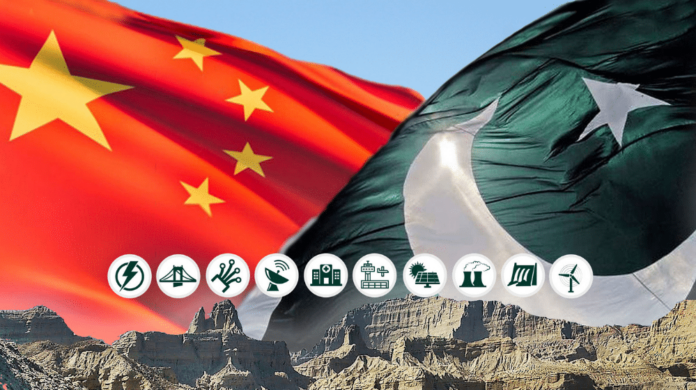پاکستان اب بھی چینی الیکٹرک کمپنیوں کے 230 ارب روپے کا مقروض ہے
The federal government has once again failed to reach a decision to pay Rs 10 billion. The Chinese power companies operating under the China-Pakistan Economic Corridor C-PEC owe Rs. 230 billion.
Pakistan had assured China three months ago that it would pay billions of rupees to Chinese power plants. Establish a revolving fund with reserves equal to 230 billion ($ 1.4 billion) and 21% of the cost of power generation. The most recent assurances came specifically from the CPEC’s 10th Joint Cooperation Committee.
Officials from the Ministry of Finance and Energy and the C-Pac Authority met on Monday under the chairmanship of Shaukat Tareen, Advisor to the Prime Minister on Finance, but failed to reach a decision on the timetable. Settlement of revolving account for settlement of outstanding dues and payment of dues with relevant Chinese companies.
There was also a problem in fulfilling the revolving fund due to lack of resources. At the time of the budget, in response to the demand of the Ministry of Energy, the Ministry of Finance has already reduced the budget subsidy by about Rs. 140 billion.
Due to technical losses, theft and low electricity bill recovery rates, electricity collections are about 20% lower than the cost of generating electricity.
China had guaranteed compensation for these losses by setting up a revolving account during negotiations on C-Pack. In addition, Chinese power producers are paid about Rs 5 billion to Rs 6 billion less per month. ۔
In the midst of these events, the amount not paid to power generators, known as ‘circular debt’, increased from Rs 1.15 trillion in June 2018 to Rs 2.4 trillion in September 2021.
The government has reportedly tried to clear some of the outstanding debts, but has not yet been able to repay the Chinese debts. If it adopts the method of clearing 40% of outstanding dues through negotiations with non-CPEC power stations, the first payment will cost around Rs 100 billion. However, compared to local power producers IPPs who have settled their tariff issues with the government, Chinese IPPs have refused to give up their fair share, and are expecting full payments.
وفاقی حکومت ایک بار پھر 10 ارب روپے ادا کرنے کے فیصلے پر پہنچنے میں ناکام ہوگئی ہے۔ چین پاکستان اقتصادی راہداری سی پیک کے تحت کام کرنے والی چینی پاور کمپنیوں کے ذمے 230 ارب روپے واجب الادا ہیں۔
پاکستان نے تین ماہ قبل چین کو یقین دہانی کرائی تھی کہ وہ چینی پاور پلانٹس کو اربوں روپے ادا کرے گا۔ 230 بلین ($ 1.4 بلین) اور بجلی کی پیداوار کی لاگت کے 21% کے برابر ذخائر کے ساتھ ایک گھومنے والا فنڈ قائم کریں۔ تازہ ترین یقین دہانیاں خاص طور پر سی پیک کی 10ویں مشترکہ تعاون کمیٹی کی طرف سے آئی ہیں۔
ایکسپریس ٹریبیون کے مطابق پیر کو وزارت خزانہ اور توانائی اور سی پیک اتھارٹی کے حکام کا اجلاس وزیراعظم کے مشیر برائے خزانہ شوکت ترین کی صدارت میں ہوا تاہم ٹائم ٹیبل پر کسی فیصلے پر پہنچنے میں ناکام رہے۔ بقایا واجبات کے تصفیہ اور متعلقہ چینی کمپنیوں کے ساتھ واجبات کی ادائیگی کے لیے ریوالونگ اکاؤنٹ کا تصفیہ۔
وسائل کی کمی کی وجہ سے ریوالونگ فنڈ کی تکمیل میں بھی مسئلہ تھا۔ بجٹ کے وقت وزارت توانائی کے مطالبے کے جواب میں وزارت خزانہ پہلے ہی بجٹ سبسڈی میں تقریباً 140 ارب روپے کی کمی کر چکی ہے۔
تکنیکی نقصانات، چوری اور بجلی کے بل کی کم وصولی کی وجہ سے بجلی کی وصولی بجلی پیدا کرنے کی لاگت سے تقریباً 20 فیصد کم ہے۔
چین نے سی پیک پر مذاکرات کے دوران ریوالونگ اکاؤنٹ بنا کر ان نقصانات کے ازالے کی ضمانت دی تھی۔ اس کے علاوہ چینی پاور پروڈیوسرز کو ماہانہ تقریباً 5 سے 6 ارب روپے کم ادا کیے جاتے ہیں۔ ۔
ان واقعات کے درمیان، بجلی پیدا کرنے والوں کو ادا نہ کی گئی رقم، جسے ‘سرکلر ڈیٹ’ کہا جاتا ہے، جون 2018 میں 1.15 ٹریلین روپے سے بڑھ کر ستمبر 2021 میں 2.4 ٹریلین روپے ہو گئی۔
حکومت نے مبینہ طور پر بقایا قرضوں میں سے کچھ کو ختم کرنے کی کوشش کی ہے، لیکن وہ ابھی تک چینی قرضوں کی ادائیگی میں کامیاب نہیں ہو سکی ہے۔ اگر یہ غیر سی پی ای سی پاور سٹیشنوں کے ساتھ بات چیت کے ذریعے بقایا واجبات کا 40 فیصد کلیئر کرنے کا طریقہ اپناتا ہے تو پہلی ادائیگی پر تقریباً 100 ارب روپے لاگت آئے گی۔ تاہم، مقامی پاور پروڈیوسرز آئی پی پیز کے مقابلے جنہوں نے حکومت کے ساتھ اپنے ٹیرف کے معاملات طے کر لیے ہیں، چینی آئی پی پیز نے اپنا منصفانہ حصہ چھوڑنے سے انکار کر دیا ہے، اور مکمل ادائیگیوں کی توقع کر رہے ہیں۔
















